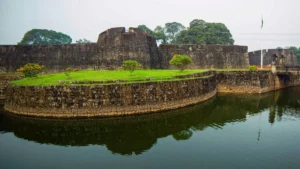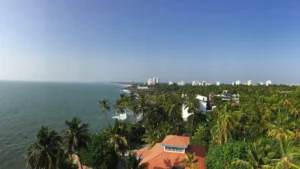Maharashtra, a state in western India, is renowned for its vibrant culture, bustling cities, and rich natural heritage. Amidst its bustling urban landscapes lie pristine wilderness areas, protected within its numerous national parks. From dense forests to rugged mountains and serene coastal regions, Maharashtra’s national parks offer a diverse array of ecosystems, harboring unique flora and fauna. Let’s embark on a journey to explore these natural wonders and delve into the biodiversity that thrives within them.
What is a National Park?
A National Park is a protected area designated by a government to preserve and showcase natural landscapes, wildlife, and cultural heritage. These parks aim to conserve biodiversity, provide opportunities for outdoor recreation, and promote environmental education. National Parks often feature diverse ecosystems, including forests, mountains, grasslands, and water bodies, and serve as crucial habitats for various plant and animal species.
Objective of a National Park
The primary objective of National Parks is to conserve and protect natural ecosystems, wildlife, and cultural heritage for future generations. These protected areas serve as havens for biodiversity, promoting the preservation of endangered species and habitats. National Parks also offer opportunities for scientific research, environmental education, and sustainable recreation, allowing visitors to appreciate and connect with nature while fostering a sense of stewardship towards the environment.
Importance of National Parks
National Parks hold immense significance as they serve as vital sanctuaries for preserving biodiversity, protecting endangered species, and safeguarding natural habitats. These protected areas also contribute to ecological balance, mitigate climate change impacts, and provide opportunities for outdoor recreation and environmental education. Additionally, National Parks promote sustainable tourism, supporting local economies while raising awareness about the importance of conservation and environmental stewardship.
List of National Parks in Maharashtra
Maharashtra, a state in western India, is renowned for its vibrant culture, bustling cities, and rich natural heritage. In Maharashtra, there are 6 national parks in total.
Check the list of national parks in Maharashtra along with their establishment year:
| National Parks in Maharashtra | ||
| S. No. | National Park | Establishment |
| 1. | Chandoli National Park | 2004 |
| 2. | Gugamal National Park | 1975 |
| 3. | Nawegaon National Park | 1975 |
| 4. | Pench (Jawaharlal Nehru) National Park | 1975 |
| 5. | Sanjay Gandhi (Borivali) National Park | 1983 |
| 6. | Tadoba National Park | 1955 |
Chandoli National Park
Establishment: 2004
Area: 317.7 square kilometers
Location: Mandur, Maharashtra
Chandoli National Park, established in May 2004 in Sangli district, was previously a Wildlife Sanctuary declared in 1985. It is a crucial component of the Sahyadri Tiger Reserve, with Koyna Wildlife Sanctuary forming its northern part. Notable for its biodiversity, Chandoli Park serves as a sanctuary for various species, contributing to conservation efforts in the region.
Gugamal National Park
Establishment: 1975
Area: 1673.93 square kilometers
Location: Amravati, Maharashtra
Gugamal National Park, part of the Melghat Tiger Reserve, was established on 22 February 1974. Situated in Chikhaldara and Dharni tehsils of Amravati, Maharashtra, it is one of seven protected areas within the reserve. Renowned for its biodiversity, Gugamal serves as a vital habitat for numerous species, contributing significantly to wildlife conservation efforts in the region.
Nawegaon National Park
Establishment: 1975
Area: 133.88 square kilometers
Location: Gondia District, Maharashtra
Navegaon National Park, situated in Gondia district, Maharashtra, is renowned for its biodiversity, particularly as the Dr. Salim Ali Bird Sanctuary, hosting nearly 60% of Maharashtra’s bird species. Each winter, migratory bird flocks grace its lakes. The park features diverse vegetation, ranging from dry mixed forests to moist forests, classified as Southern tropical dry deciduous forest.
Pench (Jawaharlal Nehru) National Park
Establishment: 1975
Location: Nagpur District, Maharashtra
The Pandit Jawaharlal Nehru National Park, also known as Pench Tiger Reserve, derives its name from the Pench river running through it. Established in 1975, it became the 25th Tiger Project in 1999, dedicated to habitat protection. Inspired by ‘The Jungle Book,’ it hosts diverse wildlife, including tigers, panthers, civets, and reptiles like the Indian Rock Python and Russell’s Viper.
Sanjay Gandhi (Borivali) National Park
Establishment: 1983
Area: 87 square kilometers
Location: Mumbai, Maharashtra
Sanjay Gandhi National Park, spanning 87 km² in Mumbai, Maharashtra, was founded in 1969, headquartered in Borivali. Within the park, the ancient Kanheri caves, carved by monks over 2400 years ago from basaltic cliffs, stand as a testament to its historical significance. Drawing over 2 million annual visitors, the park’s diverse flora and fauna make it a popular destination for nature enthusiasts.
Tadoba National Park
Establishment: 1955
Area: 625.4 square kilometers
Location: Chandrapur district, Maharashtra
Tadoba Andhari Tiger Reserve, located in Maharashtra’s Chandrapur district, is the state’s oldest and largest national park. Established in 1955, it comprises the Tadoba National Park and Andhari Wildlife Sanctuary. Encompassing 577.96 square kilometers of reserved forest and 32.51 square kilometers of protected forest, the reserve is renowned for its rich biodiversity and serves as a vital habitat for wildlife conservation.




 List of National and International Organ...
List of National and International Organ...
 Which District of Kerala is known as the...
Which District of Kerala is known as the...
 Which District of Kerala is known as the...
Which District of Kerala is known as the...








